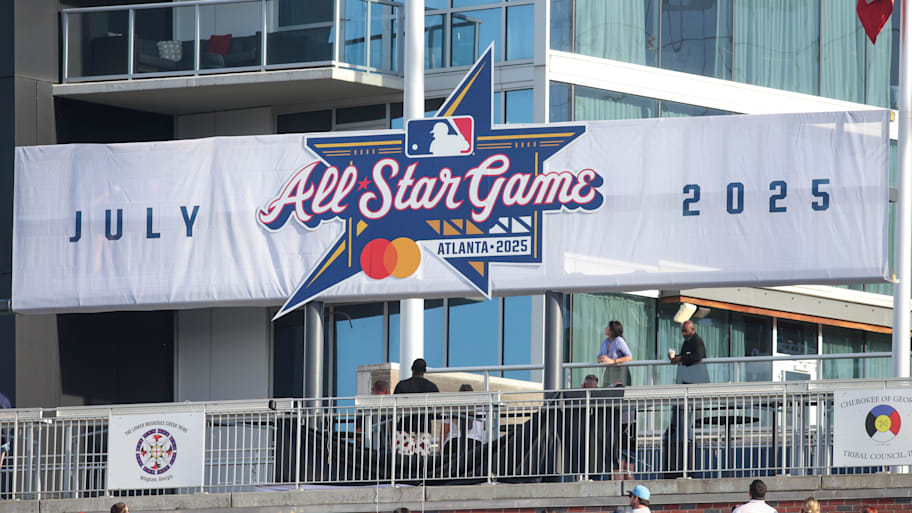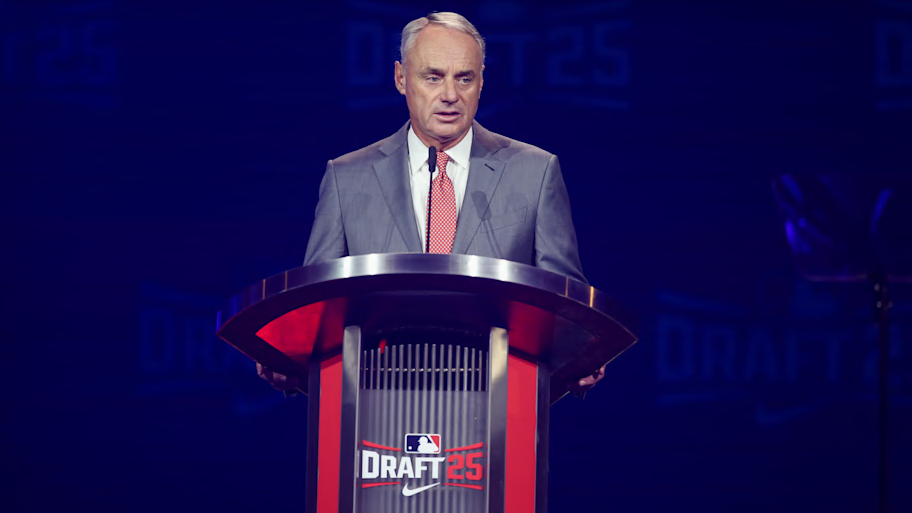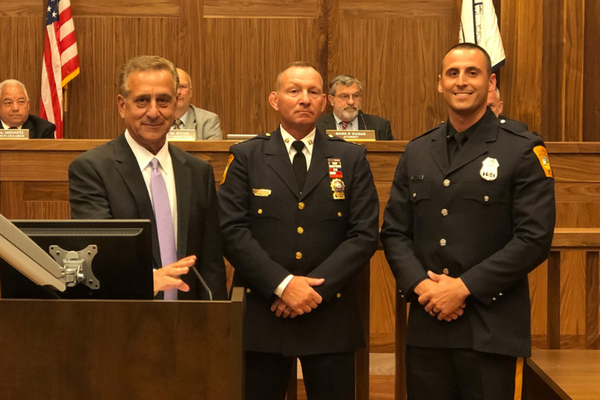
I was planning to use this column to rip MLB commissioner Rob Manfred.
It seemed like sort of a layup, to be honest. In 2021, the league moved the All-Star Game out of Georgia in response to Senate Bill 202, the state law that civil rights groups said restricted voting rights for people of color by, among other things, limiting some absentee voting and early voting.
“I have decided that the best way to demonstrate our values as a sport is by relocating this year's All-Star Game and MLB Draft,” Manfred said in a statement at the time. “Major League Baseball fundamentally supports voting rights for all Americans and opposes restrictions to the ballot box.”
The law remains in place. But on Tuesday, the All-Star Game will take place in Georgia.
Last spring, a few months after the league decided to award the game to Atlanta after all, I asked Manfred what had changed in his mind. He laughed uncomfortably and said, “Look, personal evolution. I don’t know what to say about that. Look, I think that one of the things we’ve learned over time is that the more we stay out of political issues, the better off we are, that people like their sports separate from their politics. We’ve got a fan base that’s all over the political spectrum and the safest thing for us to do is focus on baseball.”
“So you no longer see the league’s role as choosing jewel event locations based on your values?” I asked, clarifying that I meant the league’s values, not Manfred’s personal values.
“I think it is difficult to make those judgments in a way that doesn’t offend part of your fan base and that we’re better off focusing on playing the game on the field,” he said.
Remember that, I was going to say, the next time they celebrate Jackie Robinson Day or try to sell you rainbow merchandise.
I got to it, emailing representatives for all the politicians and organizations who had spoken out so strongly in favor of the 2021 decision:
- The Players Alliance, a group of more than 100 current and former players that aims to foster Black talent and that at the time released a statement saying, “We want to make our voice heard loud and clear in our opposition of the recent Georgia legislation that not only disproportionately disenfranchises the Black community, but also paves the way for other states to pass similarly harmful laws based largely on widespread falsehoods and disinformation”;
- former Atlanta mayor Keisha Lance Bottoms, who posted on social media: “Just as elections have consequences, so do the actions of those who are elected. Unfortunately, the removal of the MLB All Star game from GA is likely the 1st of many dominoes to fall, until the unnecessary barriers put in place to restrict access to the ballot box are removed”;
- voting rights advocate and former Georgia state representative Stacey Abrams, who posted, “Like many Georgians, I am disappointed that the MLB is relocating the All-Star game; however, I commend the players, owners and League commissioner for speaking out”;
- then-President Joe Biden, whose White House said, “The President has made his concerns about the bill passed in Georgia clear, given its extreme provisions that impact the ability of so many citizens to cast their votes. He said earlier this week that if the decision was made by Major League Baseball to move the All-Star game, he would certainly support that decision—and now that MLB has made that choice, he certainly does”;
- and former President Barack Obama, who posted, “Congratulations to MLB for taking a stand on behalf of voting rights for all citizens. There’s no better way for America’s pastime to honor the great Hank Aaron, who always led by example.”
I figured I’d slot in their disgusted statements about 2025 and be on my way.
Nearly a week later, with no responses from any of them, I realized I might have to write something else.
I couldn’t even get a star player, one who was reportedly influential in the 2021 move, to weigh in.
In his 2022 book, The Big Lie: Election Chaos, Political Opportunism, and the State of American Politics after 2020, MSNBC host and The Atlantic writer Jonathan Lemire wrote, “In the wake of the voting rights law, several MLB stars—including some of its most prominent Black players, like Los Angeles Dodgers star Mookie Betts—communicated privately but in no uncertain terms that they would not play in an All-Star Game held in Atlanta.”
Now, Betts says, “Honestly, I don’t even remember.” He skipped the 2021 affair even after it was moved to Denver; although he was not named to this year’s roster, he expressed no concerns about the game’s location.

Four years ago, people couldn’t stop tying MLB and SB202. Why is everyone so quiet now?
“They want to move on,” says Trey Hood, a professor of political science at the University of Georgia and the director of the university’s survey research center. He attributes the silence in part to a shift in national political climate—in 2020, some Republican politicians marched in Black Lives Matter protests; it’s hard to imagine that scene today, as President Trump and his allies do their best to demolish any policies that uplift people of color—and in part to a law that may not have had the effects some predicted.
The Brennan Center for Justice, a progressive think tank and advocacy group that focuses especially on elections, found that Black voter turnout decreased by 0.6 in the 2024 election in Georgia, but the report acknowledged that it was difficult to determine whether SB202 suppressed their votes or they just did not find the candidates inspiring. Hood says he and his students have found that among Black people who voted in 2024, 96% had an excellent or good experience. (Of course, that response does not capture those who did not vote, perhaps because the law made it more difficult for them.)
Because the outcome of the law has been nuanced—and because challenges to it are still winding through the court system—says Audrey Haynes, an associate professor of political science at Georgia who also teaches classes on journalism and mass media, many Democratic politicians have been reluctant to speak out.
“If your job depends on you putting together a coalition of people who are willing to support you, willing to give you money, talking about complex issues that are often not presented in a complex manner can hurt,” she says.
And perhaps, in the end, everyone just got tired of fighting every single battle all the time. “The issues that we were fighting for as Democrats—fair and secure elections, access to the polls, not cutting resources—that’s still going on,” says Georgia-based Democratic political strategist Tharon Johnson. “The only difference right now with the bill is that it’s just not as talked about publicly during this election season, because we’ve got 310,000 Georgians who are probably going to lose their health care insurance because of [HR1, also known as the One Big Beautiful Bill Act]. We’ve got $540 million that's going to be taken away from rural and urban hospitals in Georgia. So [SB202 is] still a very prevalent issue. It's just that every single day, Trump is doing something destructive, and you have to just kind of prioritize issues.”
Besides, Haynes points out, moving the game “didn’t do anything. The legislation didn’t change.”
Indeed, rather than expressing contrition, Republicans have mostly taken a victory lap. Earlier this week, state representative Todd Jones, a Republican, wrote in an Atlanta Journal-Constitution op-ed that MLB should apologize for making an “entirely misguided” decision in 2021.
So far the league has not gone that far, although no one around the game seems to want to draw attention to the about-face. ESPN personality and All-Star Game press conference moderator Pat McAfee addressed the question on Monday with a response that included the helpful explanation: “I would assume that there was a reason or some conversation that was had by the MLB and the state.”
Meanwhile, Georgia secretary of state Brad Raffensperger announced this month that he is planning to purge nearly 480,000 people from voter rolls. Bottoms posted that if she is elected governor, she would ensure elections are fair and Georgians have their voices heard. The Players Alliance, Abrams, Biden and Obama have not commented.
In the end, maybe the answer is simple: Everyone felt it was good business—and good politics—to speak out against SB202 in 2021, and they’ve decided it’s good business and good politics to keep their mouths shut now.
Manfred could read the room in 2021, and he can read it now. You have to give him some credit for that.
This article was originally published on www.si.com as MLB’s About-Face on Georgia’s Politics Is a Sign of the Times.







